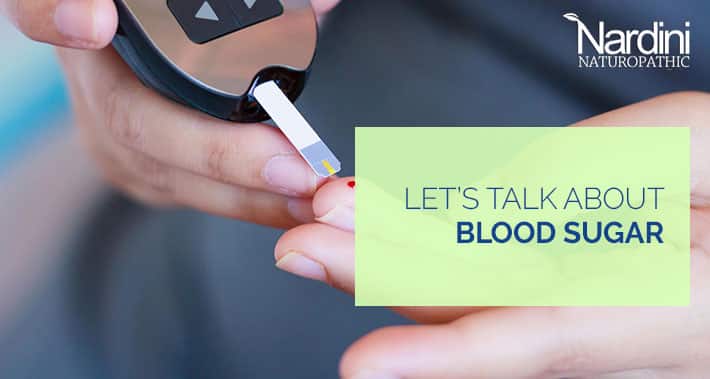You may have heard people talk about blood sugar.
If you know someone who is diabetic, they might have talked about checking their sugar levels – or if you’re diabetic yourself, you’ve certainly done this yourself.
Knowing about blood sugar is important because it can have major effects on your health and impact whether or not you develop diabetes.
I’m Dr. Pat Nardini, a naturopathic doctor in Toronto and I want to help you understand the factors affecting your blood sugar levels, why you should care about it, and what happens when they get too high, or too low.
What Happens To Your Food When You Eat It?
Whenever you eat, your body breaks your food down into its component parts.
These include the three main macronutrients: carbohydrates, fats, and proteins, as well as micronutrients,which include vitamins and minerals.
Blood sugar levels are influenced by the amount of carbohydrates in your diet.
For individuals with diabetes, monitoring carbohydrate intake is the key to managing them.
What Is Blood Sugar?
When you eat, the carbohydrates in your food cause your blood sugar, also known as blood glucose, to increase.
The blood sugar can then be used by the body for energy.
Blood sugar which isn’t used by the body immediately is stored to be used at a later point in time.
This is a good thing – it’s how your body stores energy to keep you going when you’re not eating.
If you have too much of it, though, it can lead to type 2 diabetes, which can result in damage to the pancreas, kidneys, heart, eyes, and blood vessels.
Understanding how what you eat can affect your blood sugar can help you to protect against diabetes, or help you to manage it if you already have it.
Keep reading to learn more.
What Affects Your Blood Sugar?
In addition to the food you eat, other factors that affect your blood sugar levels include the levels of insulin in your blood and the amount of exercise you get.
Let’s take a closer look at each of these factors.
1. The Foods You Eat
Foods high in processed carbohydrates are the biggest culprits when it comes to causing a blood sugar spike.
Some examples include:
● Sugary drinks
● White bread
● Processed cereals
● White grain such as pasta and rice
Intake of these foods should be limited.
Eating them with fat, fibre, and protein can help slow their digestion and reduce spikes in blood sugar.
Sugary drinks are especially important to limit as liquid carbohydrates are absorbed faster by the body than sugars from solid foods.
Eating at regular intervals throughout the day can also help keep blood sugar levels consistent and steady, to avoid sudden drops and spikes.
2. Your Insulin Levels
Insulin is a hormone secreted by the pancreas, which has an important role in controlling blood glucose levels.
People with type 1 diabetes don’t produce insulin at all, and need to inject it on a daily basis in order to control their blood sugar levels.
Those with type 2 diabetes either don’t produce enough insulin, or they do, but their bodies don’t use it properly – a state referred to as insulin resistance.
Some with type 2 diabetes use insulin injections to manage their condition. Others may be able to use diet and exercise to manage their type 2 diabetes.
3. Your Exercise Habits
During exercise, your cells absorb the sugar in the blood for energy.
This can have a significant impact on blood sugar levels, during and even hours after an exercise session.
Regular exercise can help your cells become more sensitive to insulin, which will help keep blood sugar levels steady, and within normal ranges.
What Happens When Your Blood Sugar Is Too High?
Signs of high blood sugar, or hyperglycemia, include:
● Frequent urination
● Increased thirst
● Nausea and vomiting
● Tachycardia
● Dry mouth
● Fruity odor on the breath
● Difficulty breathing
● Stomach pain
● Fatigue
High blood sugar can also result in a complication called a diabetic coma, which can be very serious.
If you, or someone you’re with, is experiencing these symptoms, get to the emergency room right away or call 9-1-1.
It’s also important to make sure the emergency staff know if you have diabetes.
Left untreated, a diabetic coma can result in permanent brain damage or death.
What Happens When Your Blood Sugar Is Too Low?
Low blood sugar is also sometimes referred to as an insulin reaction or insulin shock.
Symptoms usually have a fast onset and include:
● Shakiness
● Nervousness or anxiety
● Seizures
● Headaches
● Loss of coordination
● Numbness in the cheeks, lips, or tongue
● Blurred vision
● Hunger
● Nausea
● Feeling cool and clammy
● Confusion
● Irritability
● Dizziness
● Pale skin
● Sleepiness, weakness, or lack of energy
The only way to know for sure if someone is suffering from low blood sugar is to do a test of their sugar levels.
However, in most cases, a quick boost of sugar—like from fruit juice or honey—can help reverse its effects, at least temporarily.
Do I Need To Worry About My Blood Sugar?
As you can see, the effects of high, or low, blood sugar can be pretty severe.
Carbohydrates, in particular, have an outsized effect on causing sugar levels to spike, while fats, fibres, and protein can mitigate this by slowing absorption.
Excess calories from eating too much, or not exercising enough can result in weight gain and decrease your sensitivity to insulin, which may lead to diabetes.
Book An Appointment With Nardini Naturopathic
Are you worried about your blood sugar levels?
Have you been told you are at high risk of contracting diabetes and want to take steps to reduce your risk?
Or perhaps you’ve already been diagnosed with diabetes and want some help keeping things under control.
I’m Dr. Pat Nardini, ND and I want to help.
I can offer naturopathic solutions to manage your diabetes, and nutritional counselling to help you construct a meal plan suited to your needs.
If you are new to naturopathic medicine, I offer a free 15-minute health clarity session to answer any questions you might have and help you understand the ways in which naturopathic medicine can help.
Contact me, Dr. Pat Nardini, today to set up an appointment.
If you have questions about naturopathic medicine, or you’d like to take your first step into the world of naturopathy, contact us at Nardini Naturopathic, and let’s book an appointment.
Yours in health,
Dr. Pat Nardini, Naturopathic Doctor
320 Danforth Ave suite 206,
Toronto, ON, M4K 1N8
-https://g.page/NardiniNaturopathicDanforth
Dr. Pat Nardini, ND is a licensed doctor of naturopathic medicine in Toronto, Ontario. He offers science based natural health solutions with a special focus on thyroid conditions.


